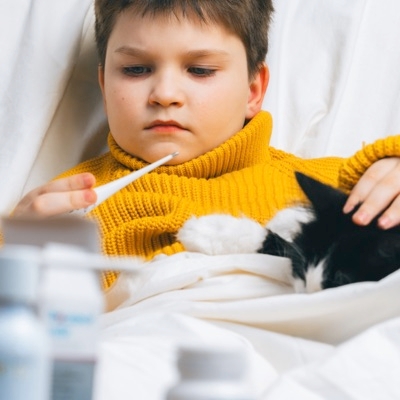Pets And The Immunocompromised Person:
Summary:
Some people with weakened immune systems may be advised to give up their pets to avoid getting diseases from the animals. If you have a weak immune system, having a pet can put you at risk for serious illness from diseases that can spread from animals to humans. Learn what you can do to protect yourself and stay healthy.


If you have a weak immune system, having a pet can put you at risk for serious illness from diseases that can spread from animals to humans. Learn what you can do to protect yourself and stay healthy.
Information
Some people with weakened immune systems may be advised to give up their pets to avoid getting diseases from the animals. People in this category include those who take high doses of steroids and others who have:
- Alcohol use disorder
- Cancer, including lymphoma and leukemia (mostly during treatment)
- Cirrhosis of the liver
- Had an organ transplant
- Had their spleen removed
- HIV/AIDS
If you decide to keep your pet, you and your family must be aware of the risk of diseases that can be passed from animals to humans. Here are some tips:
- Ask your veterinarian for information on infections that you might get from your pets.
- Have your veterinarian check all of your pets for infectious diseases.
- Wash your hands thoroughly after handling or touching your pet, cleaning the litter box, or disposing of pet feces. Always wash before you eat, prepare food, take medicines, or smoke.
- Keep your pet clean and healthy. Make sure that vaccinations are up to date.
- If you plan to adopt a pet, get one that is greater than 1 year old. Kittens and puppies are more likely to scratch and bite and to contract infections.
- Have all pets surgically spayed or neutered. Neutered animals are less likely to roam, and therefore less likely to get diseases.
- Bring your pet to a veterinarian if the animal has diarrhea, is coughing and sneezing, has decreased appetite, or has lost weight.
Tips if you have a dog or cat:
- Have your cat tested for the feline leukemia and feline immunodeficiency viruses. Although these viruses do not spread to humans, they affect the cat's immune system. This puts your cat at risk of other infections that may be spread to humans.
- Feed your pet only commercially prepared food and treats. Animals can get sick from undercooked or raw meat or eggs. Cats can get infections, such as toxoplasmosis, by eating wild animals.
- Do not let your pet drink from the toilet. Several infections can be spread this way.
- Keep your pet's nails short. You should avoid rough play with your cat, as well as any situation where you could get scratched. Cats can spread Bartonella henselae, the organism responsible for cat scratch disease.
- Take measures to prevent flea or tick infestations. Several bacterial and viral infections are spread by fleas and ticks. Dogs and cats can use flea collars. Permethrin-treated bedding can decrease risk of flea and tick infestations.
- In rare cases, dogs can spread a condition called kennel cough to people with weakened immune systems. If possible, do not place your dog in a boarding kennel or other high-risk environment.
If you have a cat litter box:
- Keep your cat's litter box away from eating areas. Use disposable pan liners so that the entire pan can be cleaned with each litter change.
- If possible, have someone else change the litter pan. If you must change the litter, wear rubber gloves and a disposable face mask.
- The litter should be scooped daily to prevent the risk of toxoplasmosis infection. Similar precautions should be taken when cleaning a bird's cage.
Other important tips:
- Do not adopt wild or exotic animals. These animals are more likely to bite. They often carry rare but serious diseases.
- Reptiles carry a type of bacteria called salmonella. If you own a reptile, wear gloves when handling the animal or its feces because salmonella is easily passed from animal to human.
- Wear rubber gloves when handling or cleaning fish tanks.
For more information on pet-related infections, contact your veterinarian or the Humane Society in your area.
Alternative Names
AIDS patients and pets; Bone marrow and organ transplant patients and pets; Chemotherapy patients and pets

